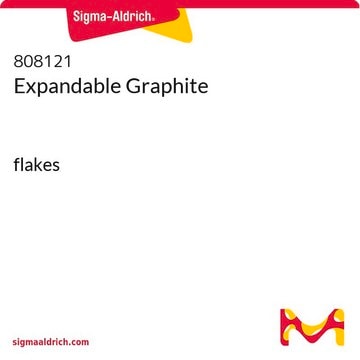496588
Graphite
powder, <150 μm, 99.99% trace metals basis
Sign Into View Organizational & Contract Pricing
All Photos(2)
About This Item
Empirical Formula (Hill Notation):
C
CAS Number:
Molecular Weight:
12.01
EC Number:
MDL number:
UNSPSC Code:
12352103
PubChem Substance ID:
NACRES:
NA.23
Recommended Products
grade
battery grade
Quality Level
Assay
99.99% trace metals basis
form
powder
mol wt
Mw 12.011 g/mol
composition
C
particle size
<150 μm
mp
3652-3697 °C (lit.)
density
2.26 g/cm3 (lit.)
application(s)
battery manufacturing
SMILES string
[C]
InChI
1S/C
InChI key
OKTJSMMVPCPJKN-UHFFFAOYSA-N
Looking for similar products? Visit Product Comparison Guide
Storage Class Code
11 - Combustible Solids
WGK
nwg
Flash Point(F)
Not applicable
Flash Point(C)
Not applicable
Personal Protective Equipment
dust mask type N95 (US), Eyeshields, Gloves
Choose from one of the most recent versions:
Already Own This Product?
Find documentation for the products that you have recently purchased in the Document Library.
Customers Also Viewed
Craig E Banks et al.
The Analyst, 131(1), 15-21 (2006-01-24)
Different types of carbon based electrodes have emerged over the last few years, significantly changing the scope and sensitivity of electro-analytical methods for the measurement of diverse targets from metal ions through gases to biological markers. This Highlight article shows
Anja Schinwald et al.
Nanotoxicology, 8(8), 824-832 (2013-08-09)
Two-dimensional graphitic carbon, graphene, is a new form of nanomaterial with great potential in a wide variety of applications. It is therefore crucial to investigate the behaviour of graphene in biological systems to assess potential adverse effects that might follow
Sang Tae Park et al.
Proceedings of the National Academy of Sciences of the United States of America, 110(23), 9277-9282 (2013-05-22)
Enhanced image contrast has been seen at graphene-layered steps a few nanometers in height by means of photon-induced near-field electron microscopy (PINEM) using synchronous femtosecond pulses of light and electrons. The observed steps are formed by the edges of graphene
Min Seok Jang et al.
Proceedings of the National Academy of Sciences of the United States of America, 110(22), 8786-8789 (2013-05-15)
Graphene is a room temperature ballistic electron conductor and also a very good thermal conductor. Thus, it has been regarded as an ideal material for postsilicon electronic applications. A major complication is that the relativistic massless electrons in pristine graphene
Kyoung Soon Choi et al.
Journal of nanoscience and nanotechnology, 13(5), 3282-3287 (2013-07-19)
A comparison was performed between the use of graphene oxide (GO) and reduced graphene oxide (rGO) as a hole extraction layer (HEL) in organic photovoltaic (OPV) cells with poly(3-hexylthiophene):phenyl-C61-butyric acid methyl ester. Hydrazine hydrate (HYD) and the thermal method (Thermal)
Our team of scientists has experience in all areas of research including Life Science, Material Science, Chemical Synthesis, Chromatography, Analytical and many others.
Contact Technical Service







